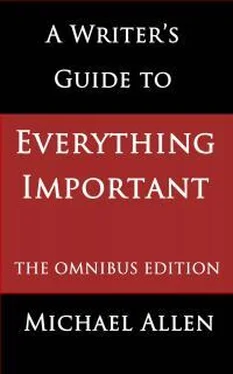Since these people all seemed perfectly genuine, and did not appear to be delusional, then of course I accept what they say. But such people are, in my experience, in a tiny minority. To put their number at 1% of the writing community would, I think, be an overestimate. More like 0.1%.
And the thought which has often come into my mind is this: can this overwhelming ambition, which is present in almost every writer breathing, be entirely healthy?
It was with that question in mind that I re-read, after a gap of 45 years or so, W. Beran Wolfe’s book, which I have described above. And so, having done that, I thought I would share with you some of Wolfe’s comments on the subject of ambition, and see where we go from there.
Dr Wolfe, I have to say, is less than enthusiastic on this matter. He has quite a lot to say about ambition, hardly any of it positive. Here are just a few quotes to give you the taste of his thinking:
A word about ambition, which rates as a virtue in the copybooks, but on investigation, betrays itself as a vice in nearly every instance....
The ambitious man has very little time for the communal fellowship that is so necessary for true happiness....
Beware of ambitious men and women. They are usually more courageous than those who are patently vain and egoistic – but the unsocial nature of their striving is apparent the moment its goals are examined....
More often than not [ambitious individuals] ask a prestige which is entirely incommensurate with their actual contribution.... [Note that, oh ye writers.]
The ambitious are constantly in a state of tension....
The special difficulties that lie in the wake of ambition deserve further discussion. Nearly every neurotic is an individual whose ambition has been frustrated.* This is almost axiomatic. Just because ambition is so generally egoistic in form and meaning, its goal is one of personal superiority which runs counter to the commonweal and the logical laws of common sense.
Sooner or later the ambitious individual is forced to admit that he is beaten and frustrated..... He must either retreat, or shift the blame for his failure to some external circumstance over which he seems to have no control.**
If you pride yourself on your ambition, take a mental inventory of its ends, and ask yourself whether you desire to attain those personal ends and forego the opportunities of being happy, or whether you prefer to be happy, and forego some of the prestige that your unfulfilled inferiority complex seems to demand....
End of quotations from Dr Wolfe.
Some comments on the passages marked with asterisks:
*‘Nearly every neurotic is an individual whose ambition has been frustrated’ he declares. Oh dear. Was there ever a writer whose ambition was fulfilled in every respect? Or do we all yearn for a bigger advance, better reviews, the Pulitzer Prize, the – oh, you fill in the rest.
**Secondly, Wolfe believes that the frustrated individual is likely to blame his failure on external circumstance over which he seems to have no control. And yet, later on in this very book, when discussing the secret of success, I will maintain that what determines the level of your success – zero to unparalleled fame and fortune – depends on exactly that; i.e. circumstances which you cannot control.
I think it is fair to say that Wolfe despises ambition, at any rate in the form that most people experience it. He argues that the only normal goal for human ambition is to know more about the world we live in, to understand our neighbours better than we do, and to live so that life is richer and fuller because of the quality of our co-operation. All other ambitions end in death, insanity, or the tragic crippling of body and soul.
Not very encouraging, is it?
Of course, as you will quickly point out to me, and as I will readily agree, Dr Beran Wolfe is not the fount of all wisdom, whether on the question of ambition or anything else. Nevertheless, I think he talks much good sense about human psychology in general, and over the years I have borne his ideas in mind, even if I have not always acted in ways which he would consider wise.
In particular, over the last fifteen years or so, I have devoted some thought to my own literary ambitions, which as a young man were undoubtedly as powerful as anyone’s. And I have been interested to try to work out what lay behind that ambition in the first place.
As I hope I have indicated briefly but clearly above, Wolfe takes the view that ambition is motivated by a sense of inferiority.
Here we immediately run into an emotional reaction. People don’t like the suggestion that they might have an ‘inferiority complex’. It makes them feel insulted. (And therefore inferior!) And yet Wolfe (basing his ideas on Adler) would argue, I think, if he were here, that feelings of inferiority are perfectly normal and indeed inevitable. The human child demonstrably is inferior, physically and mentally, until quite a few years have gone by.
The trick of living a successful and happy life, if we are to believe Wolfe, is somehow to get a realistic and true picture of the nature of that inevitable sense of inferiority, and not to let mistaken and misunderstood ideas about its nature dominate your life and disrupt it.
Easier to say than to do.
For my part, after a certain amount of introspection, I have come to the conclusion that my own ambition was fuelled by a basically flawed interpretation of certain facts and events in my childhood and teenage years.
Am I going to share these details with you? No, I am not. I’m not going to let you stand in the bathroom door while I take a crap, either, because I think that some things are best kept private. What I am going to say is that now, in my seventies, I feel much more relaxed about those twin impostors, failure and success, than I did as young man. Which is just as well, otherwise their impact would have destroyed my sanity by now. (What do you mean, it already has?)
One other point that occurs to me is that most writers’ ambitions fly in the face of what Wolfe refers to as ‘the logical laws of common sense’.
Suppose that you are a young woman of sixteen or so, and you conceive the ambition to be a hairdresser. This is an ambition which is perfectly capable of achievement. Every small town has a technical college which will train you in hairdressing. Every village, almost, has a hairdressing salon in which you can gain employment. Your ambition is therefore sensible and realistic.
But suppose you are a highly intelligent young woman of sixteen – far too bright ever to contemplate anything so modest as a career in hairdressing – is it sensible to think of a career as a full-time writer? A career which might last a working lifetime?
It is possible, as anyone who has ever had contact with a university knows, to be, on the one hand, absolutely brilliant intellectually, and yet be, at one and the same time, a complete fool. And surely even the most rudimentary acquaintance with a few publishing statistics will demonstrate that achieving a career as a full-time writer, a career which lasts for more than a few books, is a rare achievement. One which is about as likely of fulfilment as becoming a member of the US Congress, or a member of the UK Parliament. It happens, but not often.
What then, if anything, is to be done? Are we to leave the young, and the not so young, to wallow in ambitious naivety and ignorance and do whatever they will with their life?
As an early employer of mine once said to me, everyone is free to ruin their own life in their own way. And indeed they are. But perhaps, just perhaps, the older and case-hardened among us might offer a little useful advice. Experience suggests that it will not be heeded, but never mind; our consciences will be clear.
Читать дальше












